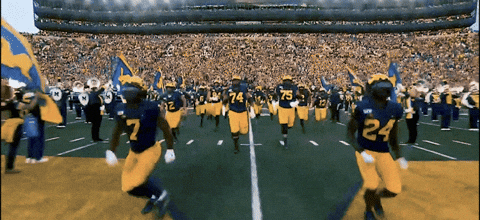Hey Fam,
I’ve had a hectic but rewarding few weeks: I tackled an unexpected round of revisions for Leverage, visited family in the Garden State, met my excellent editor, some old banking comrades, and literary peeps Anne Kadet and Dennard Dayle in The Big Apple, and reveled in Michigan’s upset victory over THE Ohio State University.
Alas, the content gods demand tribute, so in today’s issue I’m enthusiastically recommending Slow Horses, detailing the ludicrous mechanics behind “shorting” a stock, and covering Larry Ellison’s journey from college dropout to college football super recruiter.
Enjoy the show.
I. TRACK OF THE DAY
II. GET SMARTER
Dismal science: The field of economics is so ineffectual its practitioners can’t even decide whether “corruption” and “crony capitalism” are good or bad for markets.
Bear down: The hapless Chicago Bears fired their coach with the same zeal and gusto they use to draft and destroy franchise quarterbacks. On the plus side, Hard Knocks: Training Camp with the Chicago Bears is officially the funniest sports documentary of all time.
Bad planning meets wishful thinking: The Australian government intends to ban all social media usage for children under sixteen years old. Of course, they’re leaving enforcement to the same social media platforms they’re supposed to be regulating, arbitrarily designing policy (e.g., TikTok bad, YouTube good), and relying on the dumbest possible approach to managing teenagers: telling them they can’t do something and expecting them to comply.
Meme coin madness: Cryptocurrencies based on popular internet memes are surging in value because enthusiasts expect the U.S. regulatory environment to become friendlier under POTUS-45/47-elect. For example, MOO DENG, PNUT, CHILLGUY, BONK, and PEPE — which are coins based upon viral memes featuring a Thai pigmy hippopotamus, an orphaned then euthanized squirrel, a cartoon dog, a different cartoon dog, and a eugenics-curious frog — sport a combined market capitalization of more than $10 billion. The trend is so hot Hawk Tuah Girl launched her own cryptocurrency — with disastrous results, obvs. Here’s hoping the next viral meme will be inspired by a massive meteor hurtling toward earth.
Michigan Man: Larry Ellison, the eighty-year-old co-founder of Oracle and one of the world’s richest men, has become a Michigan football superfan and used his considerable resources to convince the nation’s top high school recruit to play his college ball at The Big House. Considering Ellison has zero ties to my beloved alma mater, the question everyone wanted to know was: Why, exactly, did the former college dropout do this? It seems his fifth wife, a thirty-three-year-old woman formerly known as Keren Zhu, is an alum. I guess there are upsides to our techno-oligarchic kleptocracy after all. #GoBlue
III. WATCH: SLOW HORSES
Adapted from Mick Herron’s prolific Slough House series of spy novels, and headlined by the legendary Gary Oldman and the inimitable Kristin Scott Thomas, Slow Horses follows the exploits of disgraced MI5 agents who’ve been relegated to Slough House, a bureaucratic purgatory for the fabled intelligence agency’s burn-outs, cast-offs, dunce-caps, and fuck-ups. The premise is as absurd as it is funny, and Slow Horses delivers on multiple fronts: the writing is taut, the acting is superb, the production is top-notch, and the overall package perfectly encapsulates the vibe of these bleak, trying, incredibly stupid times.
What I loved: Each season is just six episodes long, which keeps the action focused and the pacing tight. The razor-sharp writing melds classic spy tropes with blistering social satire to deliver surprising laughs as well. For example, throughout the series agents in the field face literal life-or-death consequences while their superiors back at headquarters contend with administrative cock-ups, petty office politics, HR violations, and an untold number of scandals requiring an increasingly contrived and convoluted number of cover-ups.
Slow Horse’s heart and soul, however, emanates from the ragtag crew of misfits populating Slough House’s dank, drab offices. From the anti-social hacker, to the otherwise competent agents beset by drug and gambling issues, to the prodigal turned fallen son, the ensemble cast is easy to root for and hard to love. Each thoughtfully crafted character is comprised of a complex, contradictory stew: endearing yet infuriating, brave yet stupid, brilliant yet cowardly. Nowhere are these contrasts drawn clearer than in Slough House’s slovenly, flatulent, and fiercely loyal leader, Jackson Lamb (Oldman), MI5’s ruthless, opportunistic, and ultimately pragmatic operations chief, Diana Taverner (Thomas), and the contentious yet collaborative interplay between them. Picture a truly nihilistic James Bond — played by Pigpen — butting heads with an “optics” obsessed Q — played by Martha Stewart — and you’re in the right ballpark.
What I didn’t: My main quibble with this series is the plotting can be, in both a literal and figurative sense, forgettable. Consistent with the conventions of the spy genre, characters make cryptic choices, seemingly random people do seemingly random things, and scenes and settings shift on a dime. All the while some mega-crisis is percolating in the background, but the show’s protagonists — and you the viewer — remain in the dark because vital information has been strategically withheld by the writers. Each season, at a certain point, I stopped caring about the plot altogether. In fact, while reviewing episode recaps to write this review I frequently had zero recollection of what had transpired on the show.
I suggest: Subtitles. Slow Horse’s incomprehensible accents and indecipherable slang are so overwhelmingly British you won’t understand a goddamned thing without closed captioning. This rant from the late, great Dennis Farina is apropos.
Final verdict: I quite enjoy this show and recommend binge-watching all four seasons over the holidays.
Where to watch: Apple TV+.
IV. A POEM ABOUT: GRATITUDE
Title: Moral relativism They say I should be grateful because things could always be worse. I could be a child in Palestine, mutilated and starving, an indentured, sexually abused servant, working unsustainable wages, on a cynical supply chain, for a superfluous consumer product, or infected and bleeding out, after miscarrying a non-viable fetus, in a third world shithole, called Texas. I'm immensely grateful for my lot in life. But I wonder if I should be grateful for the world we've created.
V. PRE-ORDER: LEVERAGE
My debut novel Leverage — a propulsive, darkly hilarious Wall Street thriller — will be published by Atria Books, an imprint of Simon & Schuster, on August 19, 2025.
That’s still 256 days away, but don’t forget time flies when you’re living on a planet which is rapidly becoming unsuitable for human life.
As mentioned above, my superb editor sent me a surprise, last-second round of revisions right before Thanksgiving. They were ultimately light and, as with each successive iteration, I’m confident Leverage has become sharper and more subversive.
The novel is en route to copy-editing and has officially entered the production phase of the process. Stay tuned for updates.
If you’re planning to purchase and read a copy of Leverage, I commend your lifestyle choices. If you’re also willing to snag a pre-order — which can help generate buzz and publicity within the literary ecosystem — you can do so at these fine (or not-so-fine) retailers:
Your local independent bookstore1
Thanks in advance — and always — for the support!
VI. JARGON JUNCTION: SHORT SELLING
One of the last-minute revisions requested by my editor concerned how to articulate, in accessible prose, the intricacies of so-called short selling.
His perfectly reasonable query went something like this: Can you, Dear Author and Former Finance Douchebag, in any way, which makes any sort of sense, explain how in the flying fuck short selling works?
My honest answer was: Not really.
Nonetheless, I managed to whip up an entertaining metaphor to depict the nonsensical process and slotted it nicely into the final draft. Of course, to read those words, you’ll have to procure a copy of Leverage.
Since confusion around short selling abounds — and to make your future read of Leverage even more edifying — in today’s edition of Jargon Junction I’ve provided a “streamlined” explanation and “simplified” example.
Content warning: Math.
Simply put, when a trader “shorts” a stock, they’re betting the market price of said stock will decline in the not-too-distant future. As with all finance concepts, unfortunately, nothing’s as easy as it sounds.
To profit from a forthcoming drop in the market price of a stock, an intrepid trader first has to jump through a ridiculous set of hoops. I could attempt to deploy standard English words to describe those hoops, but no matter how hard I’d try, they wouldn’t make a lick of sense. Instead, we’re going to jump right into a concrete, step-wise example which utilizes nice, round figures.
Deep breaths — let’s begin.
AG’s Proprietary Short Selling Case Study (all details fictitious and illustrative):
Imagine an “artificial intelligence” company called Rent Seeking Analytics, whose corporate mission is to eliminate human art and eradicate human joy, trades at $100.00 per share on the NASDAQ stock exchange under the ticker RENT. Presume the firm was founded by prestigious VC funds, is headquartered in Palo Alto, and noted humanitarian Peter Thiel presides over the company as Executive Chairman.
Let’s say we, as good capitalists imbued with wholesome Midwestern values, believe humans are intrinsically decent and worth saving.
More importantly, let’s assume we’ve analyzed Rent Seeking Analytics’ fundamentally flawed business model — annual paid subscriptions lol! — and we fully expect them to whiff on their upcoming earnings report. Let’s also assume we’ve determined — when our “investment thesis” proves correct — the market price of RENT could drop as low as $60.00 per share.
To save humanity from itself and, more importantly, to profit from Rent Seeking Analytics’ pain, we plan to short 100 shares of the stock2 issued by this corporate paean to misanthropy, nihilism, and techno-libertarianism.
Here’s how we make it rain:
Step 1. To sell 100 shares of RENT “short,” we first have to “borrow” 100 shares from an investment bank, broker-dealer, or analogous financial institution. For the sake of simplicity, let’s assume this transaction is sane (debatable) and easy to execute (mostly). For example, pretend we log into our account at Davos Man Inc., a Swiss investment bank which specializes in funding proxy wars and ethnic cleansing, and proceed to borrow 100 shares of RENT. Of course, Davos Man Inc. isn’t a charity, so they’re going to charge an “interest” fee to borrow those shares, which we’ll assume is 5.0% of the share price (e.g., $5.00 per share at the current market price of $100.00 per share).
Step 2. With our RENT shares in hand, our next step is to sell them into the open (or secondary) market before Rent Seeking Analytics publicly discloses its earnings. We quickly but casually offload our 100 shares at $100.00 per share and pocket the $10,000 in cash (e.g., 100 shares x $100.00 per share = $10,000).
Step 3. We watch with glee as Rent Seeking Analytics reports dogshit earnings — annual paid subscriptions lol! — and “the market” goes into a tizzy. Just as we predicted, RENT’s market price drops to $60.00 per share.
Step 4. We rush back to the open/secondary market and buy 100 RENT shares from panicked investors looking to dump their positions. This costs us $6,000 in cash (e.g., 100 shares x $60.00 per share = $6,000).
Step 5. We “close” our short position by returning those 100 RENT shares to Davos Man Inc. To recap: We borrowed 100 RENT shares from Davos Man Inc., pwned Peter Thiel in the open/secondary market, then returned 100 RENT shares to Davos Man Inc.
Step 6. When the dust settles, we tally up our earnings and pop some champagne. In total, our short bet against RENT netted us $3,500 in profit3 (e.g., we sold $10,000 of borrowed shares, bought back $6,000 of shares in the open/secondary market, and paid Davos Man Inc. $500 in “borrowing” costs; or $10,000 - $6,000 - $500 = $3,500).
Now, I’m well aware the vast majority of you savvy readers skipped this section, and the few who stuck with me are like:
Believe it or not, because I used my cleverest idea in Leverage, the case study above is about the clearest and most concise example I could conjure. And, to be sure, we’ve barely scratched the surface of short selling’s intrinsic complexities.
We haven’t addressed the trading strategy’s inherent risk (e.g., unlimited possible losses!), nor have we discussed its legitimate applications (e.g., portfolio hedging), illegitimate applications (e.g., market manipulation), or the rare instances where it can be used as a force for good (e.g., exposing corporate corruption).
Suffice it to say, short selling is among the most compelling and controversial trading strategies used in modern stock markets. The process tends to play a part in the wildest financial scandals and, as you’ve no doubt surmised, features prominently in my kickass novel Leverage.
VII. SOMETHING: CATHARTIC
VIII. UP NEXT
A festive issue should drop in about two weeks.
Stay frosty out there.
Amran
I’m drawing the distinction between Rent Seeking Analytics the corporation and RENT the stock because, as my old boss once said, “A company is not a stock.” That statement is deceptively profound and you should think about it for a long while.
To avoid even more confusion, I excluded “commissions” and “trading fees” from this example, which would’ve dented our hypothetical winnings by a few extra percentage points.










